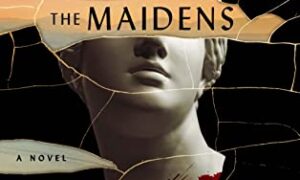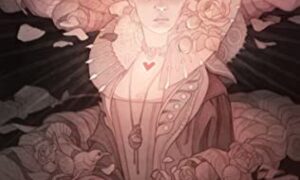 Here on Earth by Alice Hoffman
Here on Earth by Alice Hoffman
My rating: 2/5 cats


fulfilling book riot’s 2018 read harder challenge task #13: an oprah book club selection
extry points given to me, by me, for choosing a book that i have owned for more than a year.
it has been a long time since i have given a book a two-star rating, but this book earned it.
i’m not someone who takes delight in negativity, and even if i’m not in love with a book, i’m usually able to find something neutral and deflecting to say about it, or at the very least, i’m able to suggest the correct audience for it, in that “people who enjoy ___ will find much to appreciate in this book &yadda” way.
this time, though, i’m at a loss.
it tells a clear, if psychologically unrealistic, story, it has distinct characters and dialogue that is competently written and the shape of it meets all of the criteria for “how a novel is structured,” so it deserves more than a single star, but i did not enjoy reading it. nor can i come up with a profile of the reader who would enjoy it, even though, clearly, people have. and do. people who are oprah and people who are not oprah.
it’s been on my radar for a while, because i’ll read any retelling of wuthering heights. many most of them are not good, but they’re not good in ways that were easy-to-predict from their précis: shoehorning in a bunch of erotic scenes or costuming heathcliff as a rock star or a vampire isn’t going to improve upon the original – sex is sex is sex, after all, and you can read about it anywhere, and heathcliff doesn’t suddenly become more charismatic or predatory by giving him pointy teeth or a guitar. heathcliff has so often been the inspiration for antiheroic male leads, including vampires and rock stars, that turning literal heathcliff into a literal vampire feels unnecessary and derivative.
but i get why you’d try. wuthering heights is deliciously complicated and tempestuous and it’s full of shitty people being shitty to each other and scorching the earth until pretty much everyone’s left broken or dead, and what’s more fun than unrestrained melodrama? but this is just…blah. it doesn’t use the characters or the situation to any real advantage. it’s as though by using WH as its jumping-off point, it can just shorthand its own central relationship, which lies flat on the page, not earning its own tragedy, seeming to assume the reader is filling in the emotional gaps with whatever bronte-borrowed intensity is showing through its cracks.
hoffman keeps the basic framework of wuthering heights, translating the tone into contemporary smalltown realism with these occasional outbursts of gothic melodrama, which is confusing and pleasing to no one. meanwhile, so much of what makes wh work is left out entirely, and you’re left with such a pale version of the original it’s no wonder so many readers missed the connection entirely.
i have questions and complaints, and in order to vent about them, i’m going to need to discuss the plots of both wuthering heights and here on earth, so if you want those books to keep their secrets, stop reading this review right here.
these questions and complaints will be scattershot and underexplicated; i’m typing as they occur to me, but since it’s likely that no one’s reading past this point anyway, i can do what i waaaant.
most of the problems i have with this book can be summed up as: who does that?
march murray (catherine earnshaw) is 11 years old when her father goes to boston for a conference and returns with a 13-year-old orphan named hollis (heathcliff). her twenty-one-year old brother alan (hindley) declares, “He found him wandering the streets or something.” no further information is given. pause to reflect that what works in a novel set in 18th century rural england does not necessarily work in modern-day america, where you can’t really just grab a kid off the city streets and take him home without some kinda paperwork.
to repeat, alan/hindley is twenty-one. a grown-ass man, who has finished college in a desultory fashion, and is living at home, taking some law classes, in as desultory a way as undergrad, super-disappointing to his dad, who definitely likes his new pet urchin more than alan. which makes alan resentful, sure, but he behaves like a child:
Alan took every opportunity to humiliate Hollis. In public, he treated Hollis as though he were a servant; at home he made certain the boy knew he was an outcast. Often, Alan would sneak into Hollis’ room, where he’d do as much damage as possible. He poured calves’ blood into Hollis’s bureau drawers, ruining Hollis’s limited wardrobe, knowing full well Hollis would rather wear the same clothes every day than admit defeat. He left a pile of cow manure in the closet, and by the time Hollis figured out where the stench was coming from, everything Henry Murray had given him, the books and the lamps and the blankets, had been contaminated by the smell.
and then, later, alan and his similarly-aged pals beat hollis up, and tie him to a tree in the snowy middle of winter, leaving him there for hours until march finds him and frees him. a gaggle of adult men beating up a 13-year-old boy because one of ’em’s jelly that his daddy kidnapped a runaway and loves him more.
usual wh bits follow – march and hollis hit it off, go wilding together, spy on the wealthy neighbors, have more explicit intercourse than is mentioned in wuthering heights, daddy kiddiestealer dies, alan kicks hollis up to the attic, starts charging him backrent and such, hollis leaves for three years, but before he returns, fortune made, ready to take his revenge on everyone, march marries fancy next-door-neighbor richard and moves to california, where she has a daughter named gwen, and they all stay put there for nineteen years. which is different from how wh plays out.
why is this important? because march does not return home during all that time, even though many of the other events of wh do repeat here; events that would cause a normal person to buy a plane ticket: hollis marries richard’s sister, they have a kid, wife and kid both die. alan has a wife and a kid, wife dies, hollis takes kid and raises him as ward (in a much less evil way than heathcliff raised hareton). and none of those deaths or “nephew being raised by former lover/adopted brother” cause march to come home. but when this book’s nelly dean dies, off goes march, leaving richard at home, but taking their teenage daughter in tow, to settle her affairs and oopsie-whoopsie – resume her affair with hollis. who has naturally been waiting for her all this time, but has also bedded all the local ladies because he’s dreamy and rich and a man has needs.
march is in no way a catherine. she’s got no spark, no cruelty, not enough to withstand hollis’ douchiness. after some pretty unconvincing resistance, march goes full-bore back into hollis’ arms, with no sense of discretion – in full view of the gossipy townsfolk, her rivals for hollis’ backseat affections, and her fifteen-year-old daughter, who’s trying to deflect he father’s frequent calls and even when he finds out, he’s way more chill about it than he ought to be.
the hollis/march thang very quickly turns from “all-consuming greedy passion” to “super controlling and abusive,” and march becomes this sleepwalker, drifting through town in clothes from the goodwill, pale and scrawny and neglecting her self-care and her daughter, who finds her own distraction with hollis’ adopted son hank, which you will recall is alan’s son, so her own first cousin. which relationship march is fully aware but recklessly uncaring of taboo as she loses more and more of herself to increasingly violent intercourse and jealous rages from hollis, who’s still sleeping with other women. none of this is anything like the dynamic in wuthering heights, and it’s all very tedious. so much is glossed over – march and gwen were supposed to be there for two weeks and then suddenly months have passed and gwen is enrolled in school there and how much did they even pack for this?
and gwen and hank are totally overwhelmed by the situation. less so the “we’re cousins” part, more just the march-and-hollis boning part. sure, hollis is a jerk and march is letting herself go to seed and everything’s a mess, but they seem to be taking on all the melodrama that really should be more evenly distributed throughout the rest of the story.
They sit in silence, at two in the morning, as if they were an old married couple, drinking coffee and holding hands. They’re trapped by circumstance. They can feel their situation chipping away at what they might have had.
that seems more tragic than it needs to be.
On this night…they don’t talk about how their future is unraveling; they don’t think about all they have to lose. They go into that small bedroom off the kitchen and curl up together on the single bed, on top of the woolen blanket, arms entwined. If she could, Gwen would whisper that she loved him. If he could, he would vow that everything would turn out right. But that’s not the way things are now, and they both know it. That’s not the way things are at all.
i mean, really. be normal teenagers and don’t let your parents’ affair get in the way of your own intercourse.
i dunno – i had a lot of problems with this one. the hollis/march connection didn’t seem strongly developed enough in their youth to set in motion this whole cannonball, it changed the whole point of wuthering heights to have it be some lifetime movie version about a woman too consumed by her love of a man who smells like sulphur (i mean, really…) to acknowledge her own abuse – this is not my wuthering heights.
i knew i should have read Ruby







